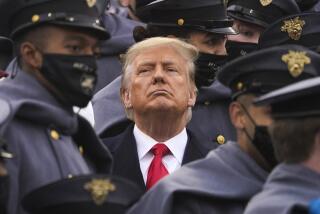Bush Must Avoid Shortcuts on Road to War
- Share via
President Bush has been busy reassuring Europeans that he “has no war plans” on his desk for an invasion of Iraq. Such statements can only evoke concern at home. Even when the president receives his plans from the military, he lacks the authority to execute them. The Constitution makes him commander in chief, but only Congress can declare war.
We have been here before.
Two days after the congressional elections of 1990, the first President Bush ordered a massive increase of American troops for an offensive against Iraq. Dick Cheney, then Defense secretary, publicly announced that the president did not “require any additional authorization from the Congress before committing U.S. forces to achieve our objectives.”
Fifty-four members of Congress responded by going to court and demanding an injunction against military action until both houses gave their explicit approval. The administration was unimpressed by the lawsuit. It told the court to stay out and treat the matter as a “political question.”
The case speedily came to trial in federal district court, where Judge Harold Greene roundly rejected the president’s claims.
While handing Congress a victory on the merits, Greene was more cautious when it came to a remedy. In his view, the time was not yet ripe for decisive judicial intervention. As far as he could tell, a peaceful settlement with Iraq was still possible, and it wasn’t clear whether a majority of Congress would oppose the war if negotiations broke down. So why intervene when the whole issue might dissolve and make judicial intrusion unnecessary?
The next move was up to the elder President Bush: He might press on unilaterally and challenge Congress to return to Greene’s court for an injunction once war was clearly in the cards. Or he could call a halt to the escalating institutional battle and ask both houses explicitly to authorize the war.
This was an easy choice for the public: Polls showed that more than 70% favored explicit congressional authorization.
After mulling over the matter, the president bowed to the combination of law and public opinion. In January 1991, he dropped his unilateralist claim and formally requested both houses to approve the attack against Saddam Hussein.
The first shot was fired only after Congress gave its consent.
The argument for legislative authorization is more compelling the second time around. In 1991, the country was responding to a clear act of aggression. Nobody could doubt that Iraq had invaded Kuwait. And a lengthy congressional debate might have cost American lives because Hussein’s soldiers would have had more time to prepare for the invasion.
The second President Bush can’t take advantage of either extenuating factor.
Rather than pointing to a clear boundary-crossing, he will be offering circumstantial evidence of Iraq’s atomic and biological weapons program. If this evidence is truly persuasive, he should have no trouble convincing a majority of Congress. But if the president attempts to skirt Congress, it will cast doubt on whether his claims can survive a fair test in the court of public opinion.
Nor is time of the essence. We aren’t dealing with a situation where Iraqi troops can dig in while Congress dithers.
A second American invasion would, at most, prevent a future threat to national security. Nobody seriously suggests that a debate of a week or a month would cause permanent damage.
There is no good reason for Bush to deviate from the precedent set by his father in 1991.
But aren’t we already embarked on a “war against terrorism”? In invading Iraq, isn’t the president simply opening another front in an ongoing struggle? This might serve as a TV sound bite, but it is nonsense as a matter of law.
Up until now, Congress authorized “necessary and appropriate force” only against those who “aided the terrorist attacks that occurred on Sept. 11.” The Bush administration has failed to implicate Hussein in those attacks. If a second invasion of Iraq is justified, it is because of a future threat.
The real question is how the administration meets its constitutional responsibilities. The first President Bush did not abandon unilateralism without a fight. Will his son also escalate the institutional confrontation at home as he accelerates war preparations abroad?
This is no time for constitutional brinkmanship. The president should take the first opportunity to say that he respects the constitutional precedents established during the Gulf War. It will be tough enough to confront the prospect of a major war soberly without attempting an end run around the people’s representatives.
More to Read
Get the L.A. Times Politics newsletter
Deeply reported insights into legislation, politics and policy from Sacramento, Washington and beyond. In your inbox three times per week.
You may occasionally receive promotional content from the Los Angeles Times.










